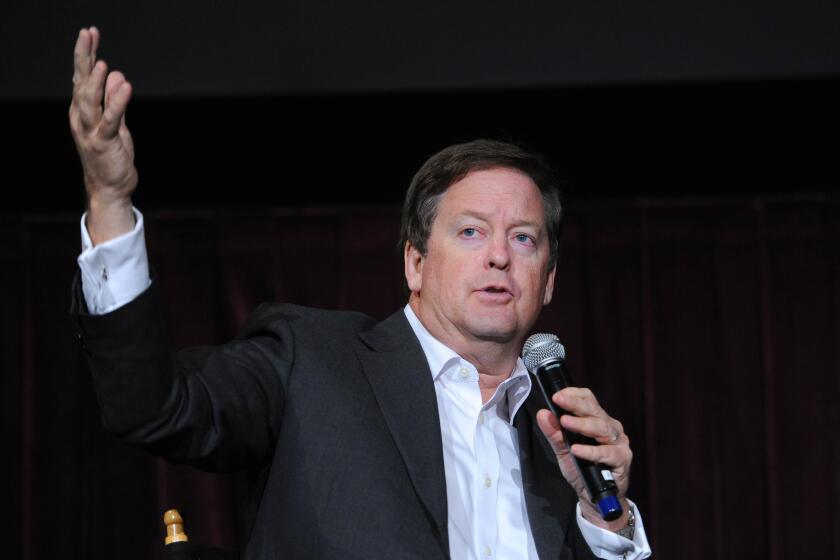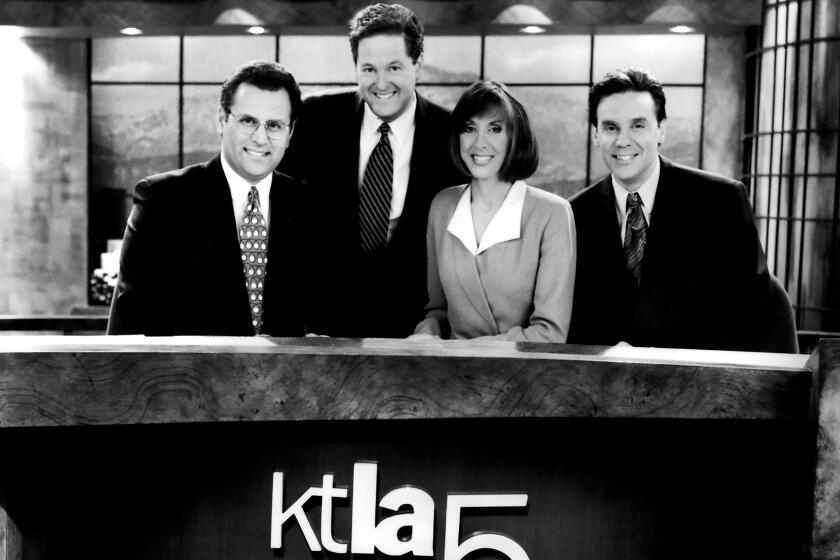DreamWorks is ready to bolt
And THEY’RE . . . off!
After winning the Kentucky Derby on Saturday, Big Brown has a chance to be the first horse to win the Triple Crown since Affirmed in 1978. But in Hollywood, all eyes are trained on a different kind of thoroughbred. May 1 marked the beginning of a window allowing DreamWorks’ top executives to shop themselves around, looking for a new studio deal after a troubled 2 1/2 -year-old marriage to Viacom’s Paramount Pictures.
DreamWorks co-founder David Geffen has been on his yacht in Tahiti since late March, but even from that distant tropical isle, his intentions have been made loud and clear -- DreamWorks’ top creative team is planning to leave the Paramount lot, a departure spurred by an endless loop of animosity between Geffen and Viacom chief Sumner Redstone and Paramount chief Brad Grey. According to an existing series of contractual outs, Geffen can announce his departure in August, creating an opening for co-founder Steven Spielberg to depart in October, triggering a key-man clause allowing DreamWorks chief executive Stacey Snider to leave as well.
Geffen isn’t talking to the press. But he made his feelings clear last December in an interview with Vanity Fair. “These people are a nightmare,” he said of the Paramount top brass, adding, “I chose to sell this company to Paramount. It turned out to be a poor choice.” DreamWorks loyalists say that Geffen is at work on a whopper, not just out of loyalty to Spielberg but because the new deal will be his last in show business. He’s been telling friends that he’s through with the movie business. With all the money in the world, he wants to pursue other interests. It is likely that Snider, an indefatigable, highly regarded executive who has become a Spielberg confidant, will become a DreamWorks partner in the new arrangement.
That still leaves a couple of tantalizing questions: Where exactly is DreamWorks going? And what form would a new DreamWorks studio take? Although DreamWorks would leave behind its development slate of upcoming films, it would continue to own the name DreamWorks, a key point in Paramount’s $1.6-billion acquisition of the studio in late 2005.
It has become apparent that Geffen is not looking at a studio financing deal, where a DreamWorks slate of six to eight films a year would be bankrolled by one of the Big Seven studios. Some say DreamWorks has already raised its own money for a production slate. Others say a different economic model is in the works that would give DreamWorks even more autonomy.
One form of autonomy is ownership. There is considerable speculation that DreamWorks could buy its own distribution system by taking over a studio. Many insiders believe Spielberg has always dreamed of owning Universal, the studio lot where he began his career and has, to this day, kept his offices and parking space. (It’s also the studio where he gets a percentage of the gate from every theme park outside of Universal City.) But it seems unlikely that General Electric, which owns Universal Pictures and NBC, would sell off one without the other and even harder to imagine that Spielberg and Co. would want the headache of owning a network at a time when advertising and ratings are down.
Another scenario would involve DreamWorks funding its own films and using the existing distribution apparatus of a major studio. DreamWorks would have total creative control over its films, while a studio would pocket a distribution fee from each film and benefit from the market share, Spielberg aura and classy product DreamWorks brings to the table, in much the same way that 20th Century Fox handled the release of George Lucas’ final trilogy of “Star Wars” films.
In an era when virtually every studio is bankrolling a big chunk of its slate with outside financing, it would be hard to image a better supplier of films than DreamWorks, which in recent years has been one of the few production entities to successfully combine big-scale commercial projects with classy higher-end fare. Geffen has always had great timing with his deal-making, going back to the days when he sold Geffen Records at the peak of the music industry’s profit-making era. After a successful 2007 led by the global hit “Transformers” and with Spielberg poised to release the much-anticipated “Indiana Jones and the Kingdom of the Crystal Skull,” DreamWorks has the look of a blue-chip filmmaking machine.
That said, with the movie industry overstuffed with product, it may be difficult to find a good studio fit for a DreamWorks distribution deal. Here’s a look at the possible landing pads for DreamWorks, with the pros and cons of each pit stop:
-
Universal
Pros: No studio has the same emotional tug as Spielberg’s ancestral home. Studio boss Ron Meyer would love to have DreamWorks back in the fold, while Spielberg and Snider (a former chairman at the studio) have an easy familiarity with Uni’s marketing and distribution machinery.
Cons: After the dysfunction of Paramount, would DreamWorks want to be anywhere near the tightly controlled GE corporate culture that drove away Snider in the first place? GE remains the antithesis of DreamWorks’ bureaucracy-free model.
--
20th Century Fox
Pros: No studio is better at opening movies, both here and overseas. Geffen is a huge fan of Rupert Murdoch, while Spielberg has surely noticed what a great job the studio did for his pal Lucas in a similar rent-a-studio situation.
Cons: As the most consistently functional studio in town, already armed with a classy production wing in Fox Searchlight, Fox doesn’t really need DreamWorks. Having built up an efficient in-house system built around total control of the filmmaking process, why would Fox co-chairmen Tom Rothman and Jim Gianopulos share their release dates with a company they don’t oversee?
--
MGM
Pros: No one needs DreamWorks more. MGM is already looking to raise money, so imagine how much more it could attract if it could run DreamWorks product through its system. Overseas, MGM product goes through the Fox distribution system, so DreamWorks would have the best of Fox’s clout without any domestic interference. New production chief Mary Parent has a good relationship with Snider -- who was her boss at Universal -- and Spielberg, who tried to hire her to help run DreamWorks years ago.
Cons: After years of struggle and turmoil, MGM still resembles a shaky start-up company, one step ahead of the creditors. After running a company that’s always operated like a plush private jet, would Spielberg would want to risk being at a company that often looks like a crop-duster held together with baling wire?
--
Warner Bros.
Pros: Time Warner chief Jeff Bewkes is clearly focused on beefing up his film and TV business as he sheds his cable company and tries to reinvent AOL. Having six DreamWorks movies a year would be a big improvement over what New Line used to deliver, making good use of Warners’ top-notch distribution system.
Cons: Worried about releasing too many movies each year, Warners needs more product like a hole in the head. With deals in place with Legendary and Village Road Show, putting DreamWorks into the mix might give the studio too many mouths to feed.
--
Paramount
Pros: Once you get past the slugfest on Mt. Olympus between Geffen and Redstone, the day-to-day relationships between DreamWorks and the studio’s marketing and publicity stalwarts have been surprisingly collegial and productive. Going elsewhere will force DreamWorks to leave behind a sizable crop of development projects.
Cons: The die is cast. Geffen is determined to create a situation that will make Spielberg happy for years to come, a situation that just isn’t in the cards here.
--
Sony
Pros: Under Amy Pascal and Michael Lynton, Sony has the same kind of filmmaker-friendly corporate culture that DreamWorks nurtures.
Cons: The studio already has too many movies to release. After its experience with Revolution, the studio may be wary of tying its fortunes to an outside film producer with as much autonomy as DreamWorks would want.
--
Disney
Pros: Has a great distribution system and built-in ties to iTunes, the distribution model of the future.
Cons: The studio’s whole philosophy is about releasing fewer movies, not more. Other than its family franchise and the Big Event movies it makes with Jerry Bruckheimer, it has little interest in the live-action business.
--
The Big Picture runs every Tuesday in Calendar. E-mail questions or ideas to patrick.goldstein@latimes.com.
More to Read
The biggest entertainment stories
Get our big stories about Hollywood, film, television, music, arts, culture and more right in your inbox as soon as they publish.
You may occasionally receive promotional content from the Los Angeles Times.






